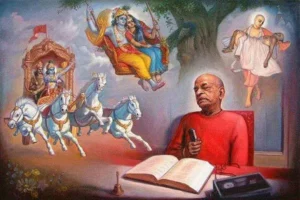

The real dharma is to surrender unto Krishna, but the rebellious living entity, instead of submitting to Krishna, engages in adharma, in a struggle for existence to become like Krishna. Therefore out of compassion, Krishna creates this material world to give the living entity a chance to understand his actual position. Just like every machine comes with a manual, Krishna provides us Bhagavad-g?t? and similar Vedic literatures so that the living being may understand who we are, what our actual position is and what our relationship is with Krishna. Vedai? ca sarvair aham eva vedya? (Bg. 15.15). This spirit of inquiry is called brahma-jij??s?. Every conditioned soul is struggling, but the human dress provides the best chance to understand his position. SB 9.24.58 Purport
Taking shelter of the Vedic literatures and the Pur??as, we can conquer the darkest region of material existence. We are in the state of forgetfulness of our relationship with God due to a solid attraction to material sense gratification from time immemorial. Our struggle for existence in the material world is perpetual, and we can’t get out of it by making plans.
We must reestablish our eternal relationship with God if we want to conquer this endless struggle for existence. And one who wants to adopt such remedial measures should read literature such as the Vedas and the Pur??as.
Foolish people say that the Pur??as have no connection with the Vedas. However, the Pur??as are supplementary explanations of the Vedas.
Nature controls everyone’s activities through three modes which combine in various ratios to shape everything we see around us. Some men are predominantly in the mode of goodness, others in passion, and others in ignorance. The Pur??as are so divided that any class of men can take advantage of them and gradually regain their lost position and get out of the arduous struggle for existence.
?r?la S?ta Gosv?m? shows the way of chanting the Pur??as for those who aspire to be preachers of the Vedic literatures and the Pur??as. ?r?mad-Bh?gavatam is the spotless Pur??a. Those who desire to get out of the material entanglement permanently must especially heed this literature. SB 1.2.4 Purport
Just as a government may issue trade licenses for its citizens to act in a certain way, the Vedas contain injunctions that restrain and regulate all of our fruitive activities. We have come into this material world to enjoy ourselves. Consequently, we can control sense enjoyment with the help of Vedic injunctions.
One who pleases his senses under the Vedic regulative principles does not become entangled in the actions and reactions of his activities. As stated in Bhagavad-g?t? (3.9), yaj??rth?t karma?a?: one should act only for the performance of yaj?a, or to satisfy Lord Vi??u.
Anyatra loko’ ya? karma-bandhana?: otherwise, the reactions of our work will bind us to this world.
Human birth is a special privilege to attain liberation from the bondage of birth, death, old age and disease. We should therefore work in such a way that we may fulfill our desires for sense gratification and at the same time gradually become free from material bondage. Action according to such principles is called knowledge. Indeed, the word veda means “knowledge.”
J??nena na sa lipyate. This sholk? indicates that by following the Vedic directions, one does not become involved in the actions and reactions of his fruitive activities. SB 4.26.7 Purport